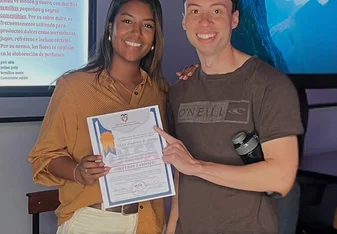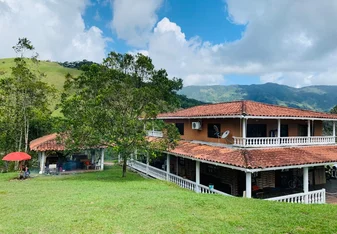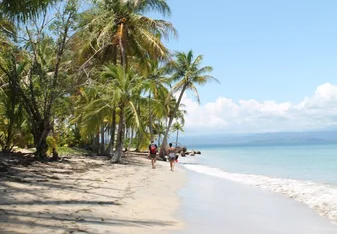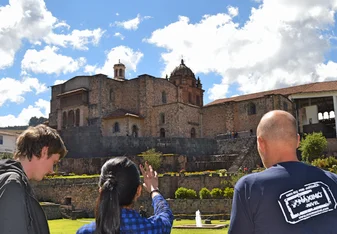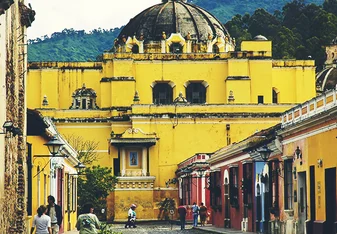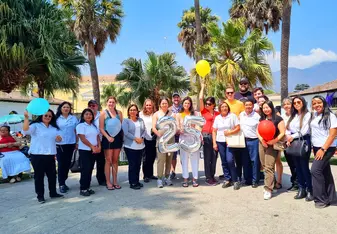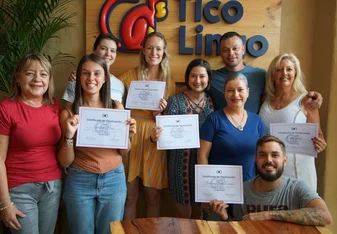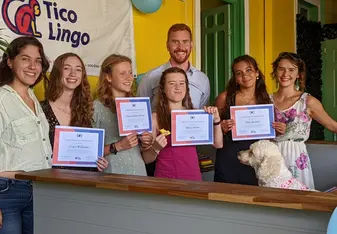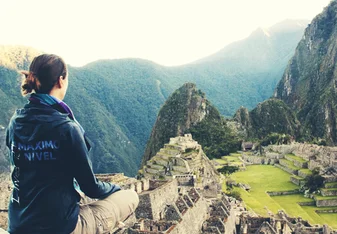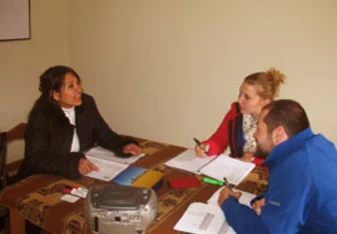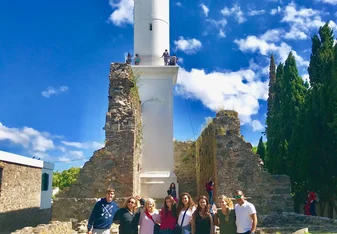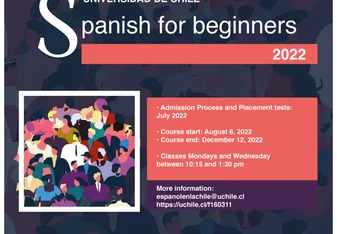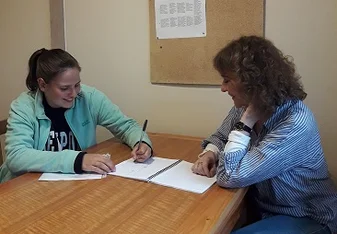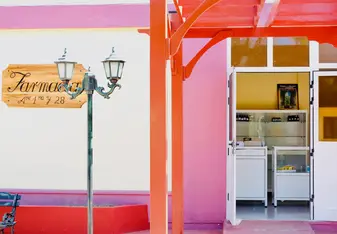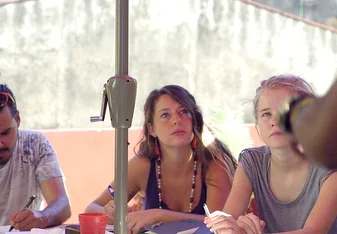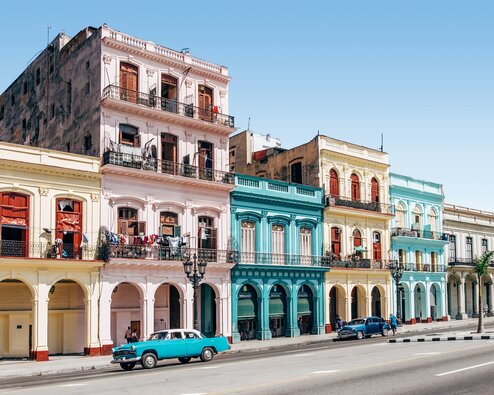
10 Best Places to Learn Spanish Abroad
We’ve broken down the 10 best countries to learn Spanish abroad to help you choose the perfect destination to improve your skills.
As the official language of 20 countries and nearly 500 million people worldwide, Spanish has the world’s second-highest number of native speakers and is becoming increasingly important in many job markets. For the travel-minded, speaking Spanish opens up a whole new world of friends and deeper connections with those you meet as you trot across the globe!
So where’s the best place to learn Spanish abroad, you ask? Unfortunately, there is no one-size-fits-all answer when it comes to learning Spanish, considering the major linguistic, cultural, and even economic differences between countries. Luckily, this means that you’re guaranteed to find one that is entirely perfect for you.
Should I learn Spanish in Latin America or Spain?
Despite differences in vocabulary, accents, and minor grammar points, the fact is, any dialect of Spanish you choose will be understood across all Spanish-speaking countries. When choosing a country, what truly matters most are your goals, interests, budget, and desire to engage with the culture and people.
You may want to consider the following points to help you decide:
- Budget: Guatemala, Peru, and Colombia are great for budget travelers. Spain, Uruguay, and Cuba, while still affordable, will run up a bigger tab.
- Interests: Do you want to surround yourself with nature or be in a big city? Do you prefer hiking or dancing? Are your culinary tastes spicy or a little more suave? Nailing down your interests will help you decide which country ticks all your boxes.
- Level of Spanish: Colombia or Spain are often considered the best places to start for beginners while more advanced students may want to jump into trickier accents like those in Argentina or Uruguay.
Read more: Should You Learn Spanish in Spain or Latin America?
Tips for learning Spanish abroad
Learning Spanish abroad is a big step in your language learning journey and likely one you won't regret. To make the most of your experience, consider some of these helpful tips before you go.
- Research programs thoroughly: Aside from the cost, you’ll want to compare what programs include. You may want add-ons like cultural events, cooking or dance classes, or a language exchange with community members. There are tons of great providers out there offering all sorts of programs and activities.
- Take your time: Spanish grammar and pronunciation can take some practice so go easy on yourself. Enjoy the process and don’t beat yourself up if you feel you aren’t progressing as quickly as you’d like to.
- Distance yourself from English: Being around other English speakers all the time won’t help you practice speaking Spanish. You’re more likely to lapse back into your native language because it’s comfortable. Stepping outside of your comfort zone is going to drastically improve your Spanish! Better yet, find a local conversation partner for a language exchange!
- Consider a homestay: A tie that unites many Spanish-speaking nations is the importance of family. Choosing a homestay with a Spanish-speaking family will give you an insight into this widely held value by introducing you to the culture (and food!) firsthand. It will also provide you with a home away from home and potential lifelong friends.
- Be fearless! Even if you don’t speak perfectly, use every opportunity to talk to strangers. Chances are, they’ll be impressed with your skills and effort even if you don’t conjugate that verb just right.
1. Colombia
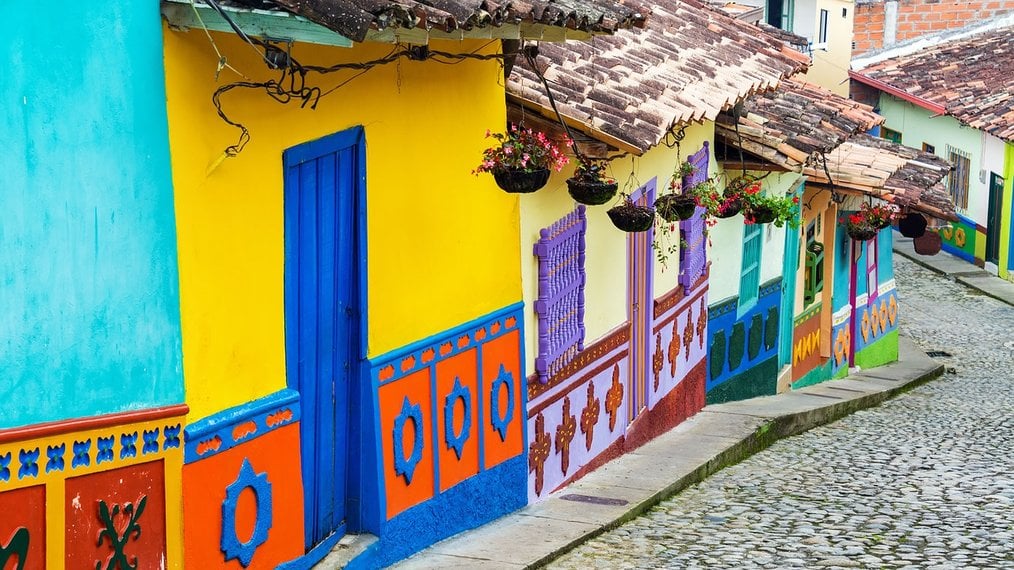
📍 Popular cities: Medellín, Bogotá, Cartagena
💰 Typical program cost: $200-$250 USD per week (generally includes accommodation)
🏠 Average monthly cost of living: $500-$700 USD
🌤️ Best times to go: December to March
Rolos (residents of the capital city of Bogotá) are quick to inform travelers that they speak the best Spanish in all of Latin America. While this title is up for debate, it’s true that Spanish speakers in central Colombia have a minimal accent and talk relatively slowly, making their Spanish among the continent’s clearest and easiest to understand.
Local folks have finally gotten wise to the considerable language advantage they have to offer, and Spanish schools are popping up in the major cities faster than you can say "arepa con queso." The government has even sponsored an initiative to market Spanish language schools as part of the country’s new branding campaign.
Bogotá and Medellín are ideal bases for weekend breaks away from the classroom to take in the coffee fincas, volcano-scattered national parks, and impenetrable jungle filled with astonishing wildlife.
✅ Pro:
- The neutral accent of many Colombians makes communication a lot easier for new Spanish speakers.
❌ Con:
- Spanish class tuition in Colombia can be more expensive than comparative classes in other parts of Latin America.
Inspiring language schools in Colombia:
2. Guatemala

📍 Popular cities: Antigua, Quetzaltenango (Xela), Panajachel
💰 Typical program cost: $155-$300 USD per week (generally includes accommodation)
🏠 Average monthly cost of living: $300-$600 USD
🌤️ Best times to go: November to March
Stunning Guatemala is filled with unique sights and experiences sure to tempt any traveler. From its black sand beaches to beautifully preserved and maintained Mayan ruins, the country has plenty to offer in terms of culture, outdoor adventures, and surprisingly affordable Spanish language classes.
The lovely city of Antigua, with its veritable feast of historic architecture and dynamic nightlife, is a particularly popular spot for students. Though it runs a little on the touristy side, there’s a vast range of good-quality Spanish schools catering to visitors, while its transport links mean you’re never short of a trip to take during your time off.
The cost of living in Guatemala is perhaps the country’s biggest draw. Even if you opt to stay in Antigua, the country’s most expensive city, the price of lessons, accommodation, and social activities remain a fraction of what you’d end up spending in a major South American metropolis like Buenos Aires or Santiago.
✅ Pro:
- The low cost of living makes it an attractive destination for budget-minded Spanish learners.
❌ Con:
- The rainy season, which lasts from May through October, can take some serious adjusting to.
Inspiring language schools in Guatemala:
3. Argentina

📍 Popular cities: Buenos Aires, Cordoba, Mendoza
💰 Typical program cost: $165-$200 USD per week
🏠 Average monthly cost of living: $550-$800 USD
🌤️ Best times to go: December to February
Everyone else on the continent will tell you that Argentina is actually the most challenging place to learn Spanish. They may have a point. The accent is exceptionally distinctive, verb conjugations are different, and there is a wide range of unique slang.
However, Argentina’s popularity among expats, study abroad students, and volunteers has made it a top destination for travelers, many of whom arrive in need of a little help with their Spanish. Buenos Aires has one of the highest numbers of Spanish schools in Latin America not to mention plenty of high-ranked universities that are open to international students.
Though it’s certainly different, the Spanish spoken in Argentina has a distinct style that differentiates it from other countries. By studying and using the Argentine brand of Spanish, you’re guaranteed a warm, friendly welcome from local residents. This comes down to the fact that Argentinos are intensely proud of their culture and identity and are eager to share it.
✅ Pro:
- Argentina is known around the globe for its dynamic culture – learn the sultry tango in Buenos Aires or take a ride with the gauchos in the grasslands that dot the countryside.
❌ Con:
- Argentina’s long-standing financial difficulties can make studying here astoundingly cheap, or painfully expensive, depending on the current situation.
Inspiring language schools in Argentina:
4. Costa Rica

📍 Popular cities: San Jose, Manuel Antonio, Heredia
💰 Typical program cost: $290-$400 USD per week
🏠 Average monthly cost of living: $950-$1,300 USD
🌤️ Best times to go: December to April
You may arrive in Costa Rica to learn, but when you’re not reviewing the past perfect or practicing rolling your Rs, rest assured, you certainly won’t find yourself bored. With hundreds of miles of beaches on both coasts, zip lines strung through misty cloud forests, and some of the world’s most impressive biodiversity, Costa Rica has so many extracurricular offerings that you might struggle to find time for actual study!
Costa Rica’s largest city is the capital of San José, but even the locals will tell you to skip town as fast as possible and head somewhere a little more scenic -- as in, pretty much anywhere else in the country. Luckily, wherever you go, the laid-back Ticos and Ticas of Costa Rica speak at a pace that won’t be too intimidating for newbies.
✅ Pro:
- Few countries around the globe can compete with Costa Rica when it comes to observing unique wildlife in its natural habitat.
❌ Con:
- If sightseeing is on your list, it may take some time to get to and from the major tourist attractions that are spread out across the country.
Inspiring language schools in Costa Rica:
5. Spain

📍 Popular cities: Madrid, Barcelona, Seville, Valencia
💰 Typical program cost: $180-$300 USD per week
🏠 Average monthly cost of living: $900-$1,300 USD
🌤️ Best times to go: March to May
If you’re interested in learning Spanish, why not do it in the birthplace of the language? If you ever learned the "vosotros" conjugation, only to be told that you’d never really need it, well, it’s time to bust it out again.
The most popular destination is Spain’s elegant capital city, Madrid. Granada, known for its striking medieval Moorish architecture, is another great option if you want to be further south. Coastal Barcelona, the playground of renowned architect Antoni Gaudí and home to both Spanish and the native language of Catalan offers a culturally and linguistically unique experience in the eastern part of the country.
Spain’s rich literary and cinematic traditions make it a truly unique place to study for international students and an excellent -- and affordable -- introduction to European life.
✅ Pro:
- Learning Spanish in Spain can put you in good stead for understanding Spanish in most other Spanish-speaking countries.
❌ Con:
- Because Spain is popular among tourists and expats alike, you may find many English speakers in major cities. While some may see that as a pro, it may prevent you from meeting and making local friends to practice your Spanish!
Inspiring language schools in Spain:
6. Peru

📍 Popular cities: Lima, Cusco, Arequipa
💰 Typical program cost: $75-$250 USD per week
🏠 Average monthly cost of living: $750-$950 USD
🌤️ Best times to go: April to November
Few countries grip would-be travelers with quite the same sense of awe as the former Inca stronghold of Peru. And while Machu Picchu is certainly a major jewel in this South American nation’s crown, the rest of the country has far more to offer -- including affordable Spanish lessons in marvelously historic cities.
Take Lima for starters: this capital city is home to faded colonial architecture, a couple of pre-Hispanic temples, and row upon row of mouth-watering cevicherías -- places where you can try the country’s inspired fish dish, ceviche, on your days off of studying.
Cusco, nestled into the Andes Mountains in the southeast of Peru, is equally breathtaking, not just for its high-altitude location but for its wealth of Inca relics that still dot its ancient streets. What's more, the city is now teeming with plenty of Spanish language schools so finding the right fit won’t be hard.
✅ Pro:
- The Peruvian accent is understandable for newbies and few other countries can rival Peru’s considerable ancient archeological sites.
❌ Con:
- Cusco and Lima are chock full of English-speaking travelers which can make it harder to put your new linguistic skills into practice.
Inspiring language schools in Peru:
7. Mexico

📍 Popular cities: Mexico City, Guanajuato, Guadalajara
💰 Typical program cost: $350-$700 USD per week (generally includes accommodation)
🏠 Average cost of living: $950-$1,100 USD
🌤️ Best times to go: December to April
Mexico has a robust linguistic tradition and a dictionary’s worth of great slang. Here, linguistic divisions are plenty, from the Mayan-influenced Spanish of the Yucatán Peninsula in the south to the more familiar norteño accent in the north, so it’s well worth doing plenty of research before you decide to learn Spanish in Mexico.
That said, for those who want to throw themselves directly into the action, the country’s enormous capital, Mexico City, is a great option, while the more sedate Cuernavaca is both picturesque and on the doorstep of a wealth of historical sites.
However, for serious Spanish-language students hoping to leave the English speakers far behind, Oaxaca has a wide variety of schools and a much lower volume of tourists, meaning you’ll likely see progress far more rapidly than in the other, more popular Mexican cities.
✅ Pro:
- If eating is high on your list, you’ll have no shortage of amazingly delicious dishes to try while studying Spanish in Mexico.
❌ Con:
- Mexicans speak Spanish fast and with a liberal dose of slang that can be hard for newbies.
Inspiring language schools in Mexico:
8. Uruguay
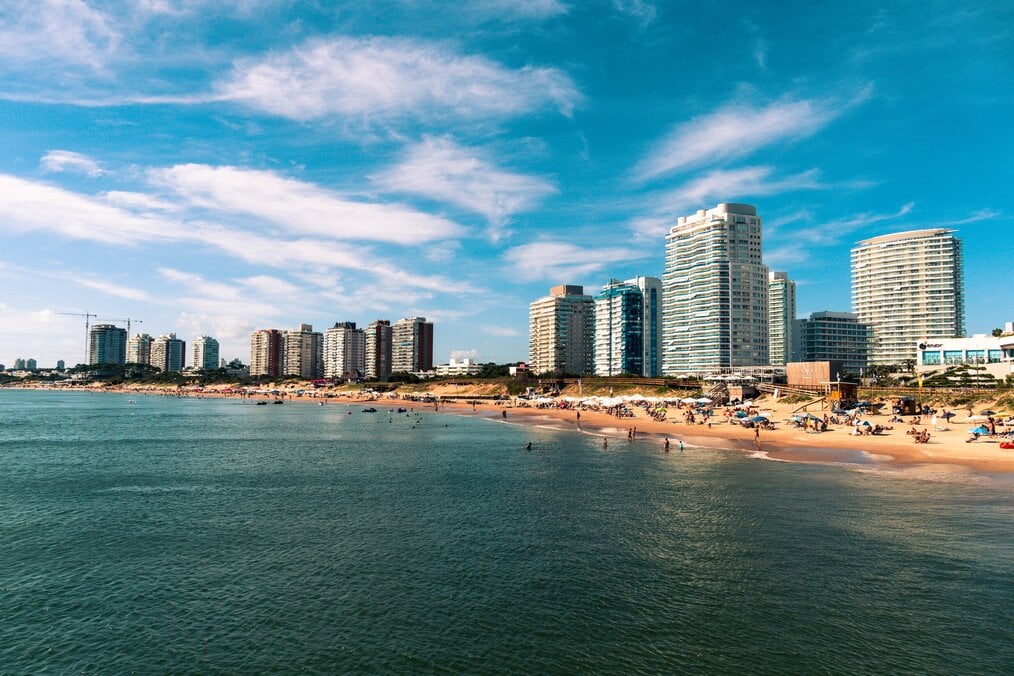
📍 Popular cities: Montevideo, Salto, Colonia del Sacramento
💰 Typical program cost: $200-$350 USD per week
🏠 Average cost of living: $1,200-$1,400 USD
🌤️ Best times to go: October to March
With over 6,000 miles of sparkling coastline, Uruguay is a nature lover’s paradise. As a country with more sheep than people, you’ll be surrounded by plenty of rolling plains where you can disconnect and find a renewed sense of peace in between mastering the subjunctive.
If city life is more your speed though, there are plenty of courses to choose from in the capital. Stroll Montevideo’s palm tree-lined streets in the afternoon after a long day of Spanish study or practice your verb tenses with new friends as you lie on its white sand beaches.
Be aware though that similar to Argentina, Uruguayans speak Rioplatense Spanish which has a distinctive (and sometimes hard to understand!) accent and uses vos (not to be confused with vosotros!) instead of tú for the second-person singular.
✅ Pro:
- Review your notes on the beach after Spanish class and spend the weekend horseback riding through the green countryside – what’s not to love?
❌ Con:
- The accent and grammar of Uruguayan Spanish may be hard to get used to if you’ve learned Spanish from Spain or another Latin American country such as Mexico.
Inspiring language schools in Uruguay:
9. Chile

📍 Popular cities: Santiago, Valparaíso, Viña del Mar
💰 Typical program cost: $100-$250 USD per week
🏠 Average cost of living: $1,150-$1,350 USD
🌤️ Best times to go: November to March
Long and thin running down 2,700 miles of South America’s western coastline, Chile is easy to overlook but is definitely not to be missed! Chile has an incredible diversity of terrain from rugged mountains to gentle sand beaches. Famous for its massive and mysterious stone figures, a trip to Easter Island is a must in between your classes.
Chilean Spanish will certainly train your ear – it has an accent unlike other Spanish-speaking countries. Native speakers across Latin America and Spain often claim that Chilean Spanish is the most difficult to understand due to pronunciation and slang alike. So, if you’re up for the challenge, give studying Spanish in Chile a try!
✅ Pro:
- Chile’s dramatic landscapes have something for everyone, whether you like hiking, surfing, or tasting local fare on a winery tour.
❌ Con:
- Chilean Spanish is challenging to understand for both new learners and native speakers.
Inspiring language schools in Chile:
10. Cuba

📍 Popular cities: Havana, Santiago de Cuba, Cienfuegos
💰 Typical program cost: $400-$600 USD per week (generally includes accommodation)
🏠 Average cost of living: $750-$900 USD
🌤️ Best times to go: November to April
Cuba draws curious travelers in with its brightly colored classic cars and intricate architecture painted all the hues of the rainbow. Outside of what you see in Cuba though is what you can feel: smooth beats of salsa on the radio that mix with the laughter of people enjoying a coffee on an outdoor terrace. Havana is a city full of energy and as a Spanish student there, you’ll be able to join the lively and sometimes frenetic pace of day-to-day life.
US-Cuban relations have been strained since around 1959 but the negative feelings are largely just government-deep. There are over 1 million Cubans and Cuban Americans living in the US and an estimated 60,000 Americans traveled to Cuba in 2021. Yes, you read that correctly! Americans can visit and study Spanish in Cuba!
US citizens must travel to Cuba under the auspices of one of the 12 authorized categories (tourism isn’t one of them!). If you’re an American interested in learning Spanish in Cuba you’re in luck – it falls under "educational activities". Your language school can issue you a letter in order to get your visa. All in all, getting to Cuba isn’t as complicated as it seems!
✅ Pro:
- Language learning programs in Cuba tend to be all-inclusive so there’s no need to worry about arranging housing, meals, or cultural activities!
❌ Con:
- US citizens can’t use ATMs or credit cards in Cuba so you’ll have to come with all the cash you’ll need for the duration of your stay.
Inspiring Language Schools in Cuba:
Where will you learn Spanish abroad?
With the number of countries that speak Spanish, you'll undoubtedly be able to find a great fit for your lifestyle and learning goals. No matter where you choose to learn Spanish abroad, the opportunity to learn about another culture will provide you with much more than just an increased vocabulary.
Learn more about studying Spanish abroad:

